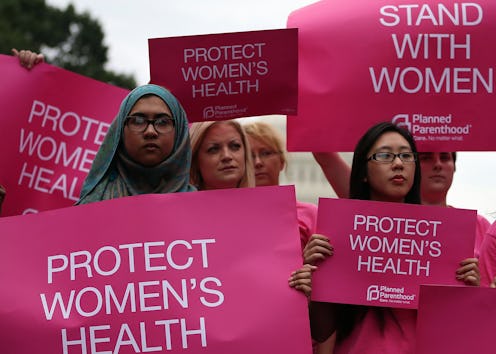News
Two Lawmakers Explain How Their Bill Would Help WOC Get Equal Access To Abortion Care

On Tuesday, two Democratic lawmakers unveiled a bill that would lift certain federal restrictions on abortion funding. The Equal Access to Abortion Coverage in Health Insurance (EACH) Woman Act, introduced by Rep. Barbara Lee in the House and Sen. Tammy Duckworth in the Senate, would dismantle restrictions that bar federal dollars from being used to pay for abortion services. The two lawmakers tell Bustle that the legislation aims to combat discriminatory rules that have a particularly adverse effect on poor women and women of color.
"The bottom line is that no woman should be forced to carry an unwanted pregnancy to term just because she’s poor. Someone’s zip code and the contents of their back account shouldn’t prevent them from exercising their constitutional right to choose," Rep. Lee says in an email. "This bill is about ensuring that ALL women, regardless of race or socioeconomic status, [are] able to make the best health care decisions for herself."
The bill would expand access to abortion in two ways: by allowing federal dollars to pay for abortion services — which is currently banned under the Hyde Amendment — and, also, by prohibiting politicians from pushing initiatives that dictate whether or not private insurers may cover abortion services in their respective states.
As it stands now, the Hyde Amendment prohibits any federal money from paying for abortions, except in cases of rape or incest, or if the woman's life is in danger. The rule was first passed in 1976 and Congress has renewed it every year since as part of the Labor-Health and Human Services appropriations bill, although it has changed slightly over time. (The original text of the legislation provided no exceptions at all.) This stops the federal government from paying for abortions through programs like Medicaid, instead leaving it up to state legislators to decide how and when to fund abortion coverage.
And as for private insurance, the Guttmacher Institute reports that 11 states restrict abortion coverage on private policies offered within their borders. On top of that, the institute reports that 26 states have laws limiting abortion coverage in insurance plans offered through their state exchanges. Proponents of the EACH Woman Act tell Bustle that this creates a culture of inequality around abortion coverage, an issue that they say the bill would help mitigate.
"People who are poor [and] people who are people of color tend to have more restrictions on them, yet if you are wealthier and able to go and pay to travel to another state, if you’re wealthier and you’re able to pay out of pocket, then you can actually continue to have access to what has now been decided by the Supreme Court to be a right," Duckworth tells Bustle, referring to the court's landmark Roe v. Wade ruling.
Tuesday marks the first time that the EACH Woman Act has been introduced in the Senate. It has been introduced in the House twice before, but the bill did not move forward either time. Both Duckworth and Lee say it is significant that two women of color introduced the legislation in Congress again on Tuesday.
"We now have the most women of color in Congress in history — and we know that women of color are disproportionately affected by bans on abortion coverage," Lee says. "[It's] critical for women of color to be leading these efforts."
Destiny Lopez, the co-director of All* Above All, an organization devoted to protecting and expanding public abortion insurance coverage, appears optimistic about the bill's future. (All* Above All is one of the bill's key advocates.) Lopez points to the opportunity to educate the public on the barriers that some women face when they seek abortion care.
"I think that there has been…such awful, hateful rhetoric around abortion," Lopez tells Bustle. "For us, the introduction of the EACH Woman Act provides an opportunity to shine a light on the barriers that people seeking abortion face."